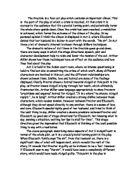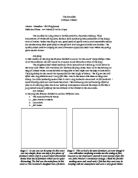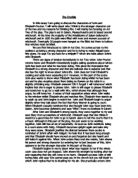The above paragraph describing some aspects of Act 3 is significant in terms of the whole plot, as it is a crucial pivotal turning point in the play. When Elizabeth faintly says “No sir”, from that moment on, there is a significant idea of what will happen next, which reveals the rest of the story. It reveals that Proctor is guilty as he is shown to be a ‘liar’. However if Elizabeth was to say “Yes sir”, it would have been a completely different story, which would have made Abigail guilty. This point in the play is significant, as in my opinion it is the most grasping, tense moment in the entire play.
The opening of Act three quickly contrasts from the ending of Act two. At the end of act two Mary is being pleaded to by Proctor with a desperate powerful need, it’s in a way forceful. Proctor wanting Mary to confess that it is Abigail and the other girls fault of the rumoured witch craft, in order to save Elizabeth. In contrast to Act two, Act three starts with a cold, plain, dull setting. Millers stage directions describing the room; ‘…high windows’ and ‘…heavy beams’, gives an image of a prison like room. The opening of Act Three leaves a stressful, manic room of tension at the ending of Act two. Proctors strong use of dialogue ‘My wife will not die for me! I will bring your guts into your mouth…’ shows that he is a powerful man and is full of fury. The sentence structures are different in the Acts, as in the end of act two the structures are long and explosive, where as in beginning of Act 3 sentence structures are shorter and precise. Miller creates dramatic interest with the immediate change of atmosphere between the Acts.
Miller has few cases of verbal irony. He uses it in act three, while Elizabeth tells the court that Proctor did not sleep with Abigail she knows that he did.
All parts with the girls lying about witches and ghosts are cases of dramatic irony since, while the audience knows that the girls are lying, most of the characters do not. For example, in court, Abigail and the other girls pretend to be attacked by spirits and the people in court fear them to be in danger. However, the audience knows that they are faking it.
In Act three there are various different parts which consist of highly dramatic interest. Tension is created with the questioning of John Proctor. The questioning follows Danforth’s comment that the “hot fire here…melts down all concealment”, this reminds the audience of what John Proctor has concealed. The purpose of this questioning sequence is to establish Proctors status as a Christian, to establish his truthfulness and finally to establish Proctors cause and purpose.
Parris and Cheever both make potentially damaging contributions towards proctor in the questioning. Cheever states “He plough on Sunday sir”, and then Parris asks “Do you read the Gospel, Mr. Proctor?”. These accusing questions are spelt out at Proctor to reveal his status as a Christian of truthfulness. Proctor deals with the intense questioning with intelligence, a lot of Proctors answers in this sequence are short and quick. This direct dialogue creates the surety of Proctor. “Aye sir…No sir…I am sir…”.
The pace of this sequence of the questioning seems to be a quick pace. The questions are straight after one another, creating a fast pace. Miller uses these short sentences to create a rush of tension amongst the characters. Miller uses different use of dialogue, Danforth’s lines on page 72 seem quick, demanding, punchy and to the point. He says a lot more than Cheever and Hale which gives the impression that Danforth has a lot of power, and is sending off a forceful side.
Danforths speech at the top of page 76 “…a person is either with this court of he must be counted against it, there is no road between”. Danforth’s speech in some way relates to what Jesus once said, ‘ you are either with me or you are not’. Good or bad, God or devil, heaven or hell, but no between. This creates a dramatic interest as it makes the audience question and sympathize with the situation.
It is important that any play has successful dramatic interest or devices and effects. Without these the play would be very dull and unexciting. The audience would soon loose interest. Dramatic impact and effects are used to create tension and suspense, these may include sound, movement and atmosphere. An example of sound being used as a dramatic effect would be on page 77 , ‘when voices of towns’ people rise in the excitement. This is a dramatic device, as it will make the audience more interested as they will want to know what happens next. Dramatic irony is also a dramatic device as it is a form of irony in a play. There is dramatic irony in the play when, Danforth questions Mary Warren, “Has he ever threatened you?” and Mary Warren replies “No Sir”
Act 3 starts with voices off stage, there is no visual. The audience can hear Hathorne, Martha Corey, Danforth and Giles. The tension rises as you cannot see the actors, but can only hear their speech. The stage direction is off stage ‘a roaring goes up from the people’ this makes the audience think, what will happen next. In the speech some repetition and rhetorical questions are used to make the audience feel sympathy, anger or worry.
The most dramatic point in Act three, and possibly the whole entire play is where Elizabeth utters the words “No Sir”. From that moment forward, the story changes, and this is potentially a pivotal point in the play.
This dramatic moment is held in the court where most of the main characters are based. This moment in the play is where the audience is mostly fully and emotionally engaged. The audience sympathizes with the lie with Proctor and Elizabeth because they are clearly good characters. Miller uses various techniques to build up this moment in the play. Dramatic irony is used as the audience and some main characters know about Proctor and Abigail, but not all. Miller uses a variation of pace, for example Elizabeth’s answer on page 90-91, Miller uses several dashes to create a slow tense pace. Elizabeth not wanting to answer the questions directly as she is keen to defend her husbands reputation. Before Elizabeth’s “No Sir” there is a sense of stillness on stage, it is carefully created by the layout of the characters, the tension is being held. The stillness was almost like a tableux. This stillness grasps attention to any slight movement and speech that Elizabeth does. However after “No Sir”, the pace quickens, and there is a flurry of movement, this indicates that the crisis is over.
Using the historical subject of the Salem Witch trials, Arthur Miller's play (1953) presents an allegory for events in contemporary America. The took place in Salem, in 1692. “Allegory is when a narrative abstractly refers to something else.” Or to be more specific, The Crucible is an allegory of the "Red Scare" in the U.S., when there was a "witch-hunt" for communists. The US government was much like the men in Salem, eagerly arresting and putting on trial anyone who might have been considered a communist until it spiraled out of control and no one was safe, like in The Crucible.
The end of Act three has a lot of dramatic interest. Everything and everyone seems to be very manic, panicked, frantic and hysterical. When Mary joins in with Abigail screaming that they love god, promising to “hurt you no more”. Proctor is in disbelief and shocked at the girls acting, this feeling is mirrored by the audience who feel the tension mounting rapidly, Proctor loses control and shouts [his mind wild and breathless] “ I say – I say- God is dead”, this quotation shows his state of mind. Although he may seem berserk; all that he says is true, especially his last words “ you are pulling heaven down and raising up a whore!”, Hale leaves after this. The curtain falls, and the audience is left emotionally drained in this act from all the action. All the tension and hysteria that was building up in previously reaches a climax at the end of this act.
Act four follows on from Act three from its preparation. It is staged in the isolated jail of Salem. The stage directions tell us that the place is in darkness and that the moonlight only ‘seeps’ in through the bars. This creates a depressing atmosphere and this is evidence that the end was certain and there is little hope in freedom.







